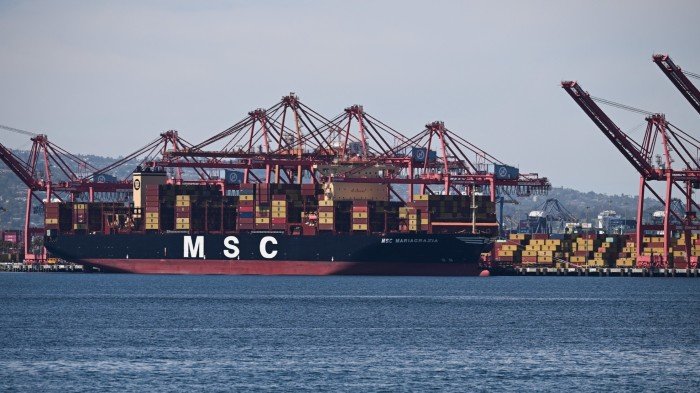Unlock the Editor’s Digest for free
Roula Khalaf, Editor of the FT, selects her favourite stories in this weekly newsletter.
Diplomats have passed a UN plan to charge ships at least $100 for every tonne of CO₂ they emit above a decarbonisation target, defying a threat from the US to retaliate against such a measure.
The deal at the UN’s International Maritime Organization represents a compromise between polarised member states — but will also disappoint those who had called for a high fee to be imposed on every tonne of shipping emissions.
The agreement also risks provoking retaliation from the US, which withdrew from negotiations on the policy this week and threatened “reciprocal measures” against any fees imposed on its ships. It’s unclear what form those measures could take.
The IMO said the deal, which is set to be formally adopted in October before being put into action by 2028, was passed by 63 member states on Friday. Some 16 voted against and 24 abstained, with a delegation of large energy exporters, including Saudi Arabia and the United Arab Emirates, opposing the deal.
Shipping energy analysts say the plan was unlikely to slash the industry’s emissions fast enough to hit the IMO’s target of hitting net zero emissions “by or around” 2050.
“This deal is not fit for purpose to deliver IMO’s own 2050 net zero and intermediate targets,” said Faïg Abbasov, shipping programme director at environmental group Transport and Environment.
But he added: “Multilateralism isn’t dead. Despite a tumultuous geopolitical environment, the IMO deal creates a momentum for alternative marine fuels.”
After nearly two years of fraught negotiations, the agreement is a complex compromise between countries that called for a straightforward levy on every tonne of emissions and others that backed a less punishing credit trading scheme.
Pacific Island nations, which are particularly exposed to rising sea levels, had argued a levy was the most effective way to incentivise shipowners to transition to more costly green fuels.
But large exporters and, more recently, the US have protested against the additional costs that could be passed on to the price of goods such as food, particularly while low-carbon fuels remain scarce.
The shipping industry delivers about 80 per cent of international trade and is almost entirely dependent on fossil fuels, making it responsible for about 3 per cent of global emissions according to the OECD.
The proposal, which would be reviewed after three years, sets two decarbonisation targets for all ships with a volume exceeding 5,000 gross tonnes, which would steadily increase over time.
Those missing the tougher target would initially have to pay the IMO $100 annually for every tonne of CO₂ emissions or equivalent greenhouse gases that exceeds this goal.
Those falling below the weaker target would have to pay up to $380 for every tonne of emissions above this level. These ships could pay that money to the IMO, or buy credits from vessels that meet both targets by running on lower-carbon fuels.
The strictest target requires ships to reduce their greenhouse gas fuel intensity by 17 per cent by 2028 compared with 2008, rising to 21 per cent by 2030. The less stringent target is 4 per cent rising to 8 per cent over the same period.
The IMO can use these revenues to compensate ships using low-carbon fuels, while investing in decarbonising the maritime sector, and addressing any negative impacts of the measures on food security. These investments will be made with “particular attention to the needs of developing countries”, the plan says, an outcome that was opposed by the US.
As part of their earlier agreement to achieve net zero around 2050, IMO member states had agreed to reduce annual shipping emissions by at least 20 per cent by 2030.
The prices per tonne are much higher than those paid by large polluters in the EU under the world’s largest mandatory carbon payments scheme, which stood at €62 on Friday.
But observers including Danish shipowner AP Møller-Maersk have warned during the negotiations that the industry may not be incentivised to invest in the most sustainable fuels over other alternatives such as liquefied natural gas.
Abbasov warned that “forest-destroying first generation biofuels [would] get the biggest push for the next decade” under the plan.
